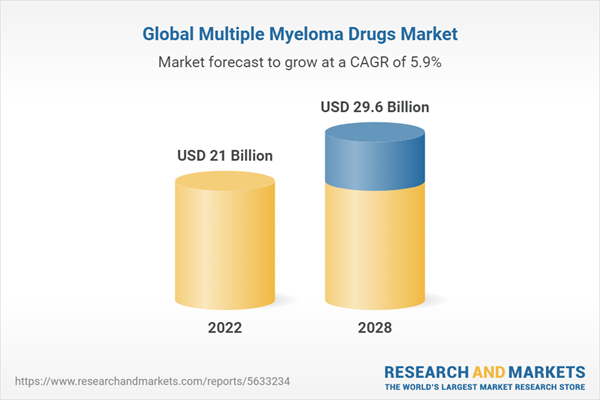Dublin, Oct. 25, 2023 (GLOBE NEWSWIRE) -- The "Multiple Myeloma Drugs Market: Global Industry Trends, Share, Size, Growth, Opportunity and Forecast 2023-2028" report has been added to ResearchAndMarkets.com's offering.
The global multiple myeloma drugs market has experienced substantial growth, achieving a noteworthy US$ 21.0 Billion in 2022. Projections by industry experts indicate continued expansion, with the market expected to reach an impressive US$ 29.6 Billion by 2028.

Revolutionizing Multiple Myeloma Treatment:
Multiple myeloma, also known as Kahler's disease, is a form of blood cancer primarily affecting plasma cells. The market for multiple myeloma drugs includes chemotherapeutic agents, corticosteroids, and immunomodulatory agents, which play a crucial role in promoting bone healing, preventing complications such as hypercalcemia, bone fractures, spinal cord compression, and anemia, while minimizing the need for chemotherapy. Chemotherapeutic agents encompass various anthracycline antibiotics and alkylating agents like melphalan, doxorubicin, vincristine, and liposomal doxorubicin. Additionally, targeted therapy drugs, including proteasome inhibitors like bortezomib, and other compounds such as dexamethasone, prednisone, and thalidomide, are utilized in treatment.
Market Trends and Drivers:
- Advancements in Healthcare: Significant developments in the healthcare sector, coupled with the increasing prevalence of hematological cancers, drive market growth.
- Biologic Therapy: Rising consumer awareness about the benefits of biologic therapy drugs, which harness the body's immune system to identify and combat myeloma cells, is boosting market expansion.
- Technological Innovations: The development of microRNA therapeutics and nanomedicines for multiple myeloma treatment, facilitating the delivery of macromolecular agents into the bone marrow and catalyzing antitumor responses, is a key growth driver.
- Healthcare Expenditure: Increasing healthcare expenditures and extensive research and development (R&D) activities in medical sciences further propel market growth.
Key Market Segmentation:
The report presents comprehensive market segmentation:
- Therapy: Targeted Therapy, Biologic Therapy, Chemotherapy, Others
- Drug Type: Immunomodulatory Drugs, Proteasome Inhibitors, Histone Deacetylase Inhibitors, Monoclonal Antibody Drugs, Steroids, Others
- End-User: Men, Women
- Distribution Channel: Hospital Pharmacies, Retail Pharmacies, Online Pharmacies, Others
- Region: North America, Asia-Pacific, Europe, Latin America, Middle East and Africa
Competitive Landscape:
Key players in the multiple myeloma drugs market include Amgen Inc., Bristol Myers Squibb, Daiichi Sankyo Co., Ltd., Sanofi-Aventis Groupe (Genzyme Corporation), Johnson & Johnson Services, Inc., Merck & Co., Inc., Novartis International AG, Pfizer Inc., PHARMA MAR, S.A., Takeda Pharmaceutical Company Limited, Teva Pharmaceutical Industries Ltd., and more.
Key Questions Addressed in the Report:
- What was the global multiple myeloma drugs market size in 2022?
- What is the projected CAGR for the market during 2023-2028?
- What are the primary factors fueling market growth?
- How has COVID-19 impacted the multiple myeloma drugs market?
- What is the market breakdown by therapy, drug type, end-user, and distribution channel?
- Which regions are pivotal to the multiple myeloma drugs market?
- Who are the prominent companies in the multiple myeloma drugs market?
For more information about this report visit https://www.researchandmarkets.com/r/d9ti14
About ResearchAndMarkets.com
ResearchAndMarkets.com is the world's leading source for international market research reports and market data. We provide you with the latest data on international and regional markets, key industries, the top companies, new products and the latest trends.
Attachment
